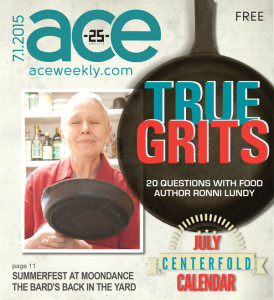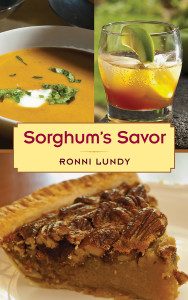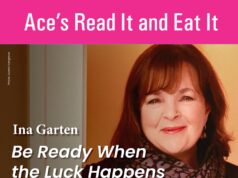 20 questions with food author Ronni Lundy
20 questions with food author Ronni Lundy
“Cook with curiosity. Serve it up with love.”
—Ronni Lundy’s culinary philosophy
If you’re already a fan of Kentucky native and food writer Ronni Lundy, you know not to pick up her new book, Sorghum’s Savor, expecting a conventional “cookbook.” The books that came before it — although they contain wondrous recipes — aren’t cookbooks either (Butter Beans to Blackberries; The Festive Table; and Shuck Beans, Stack Cakes and Honest Fried Chicken.)
Her writing, then as now, would be better characterized as part anthropology, sociology, family history, travelogue, and part southern literary renaissance.
She responds, “I would have to own that while I love to cook, recipe is not my primary interest in writing about food. I am profoundly grateful to those for whom it is and for their work, which informs mine, and I try to live up to good practice and honor great cooking when it comes to writing recipes, but I am as interested as much in why we are doing what we’re doing when we stand at the stove as the how. And that interest is personal, political, sociological and extremely historical. The great thing in writing about food (and the secret subtext hidden in many recipes) is its revelation of the voices of people who traditionally have not been consulted when history is told—even their own history. Recipe and cookbooks are where we hear what women’s lives were actually like in different eras, and what constituted daily life for the family. If you want to look at it in those terms, in food we learn the experiences of the humble, the poor and the outcast as well as those who have it made. Food is an easy door into strange cultures and stories. Plus you get to eat while you’re doing all that research.”
“With Sorghum’s Savor, my interest in its past had to do with discovering why sorghum syrup—once made all across the continent—has persisted as a process and a beloved flavor in the mountain south when it has faded elsewhere. There were surprising lessons of politics and economics I discovered, but also there was the revelation of an ethos of independence, and the appreciation of complexity in taste (mixing your sweet with a little bitter and tart) that inform my understanding of the culture I come from. Maybe you could say that’s poetry in there, as well, then.”
She incorporates a few non-traditional recipe options for sorghum in the new book (Rosh Hashanah bread, anyone?). Asked about other sorghum surprises she’s discovered along the way, she says they weren’t all unexpected. “I knew it worked in Japanese, Korean and Chinese dishes because I’d been doing that for some time. I was surprised and delighted how beautifully it worked with Bengali recipes and with masala in general. That’s logical, of course, when you consider that jaggery is a traditional sweetener across India and is basically sugar without the molasses removed. We’re working in the same general flavor palate.”
“I also was intrigued to find it working with tequila. Bourbon was a given for me. I mean, they’re practically cousins, but the Sour-garita that Anna Bogle and Amelia Kirby came up with at Summit City Lounge in Whitesburg actually made me want to drink it. And I can tell you that tequila and I haven’t been on speaking terms for decades.”
In the book, she describes sorghum syrup as having “what my mother would have called ‘a whang to it.’ That’s the slightly sour taste that cozies up perfectly with the intense sweet of sorghum when it first hits the mouth. It resolves into a buttery resonance, what chefs like to call sorghum’s umami…” Which leads to questions about all the interesting ways she’s found to make the “whang” work for a dish.
“I’m my mother’s daughter,” she says, “so ‘whang’ is always high on my list of great attributes for a food. I often put a spoonful of sorghum in a pot of something knowing you will never taste it flavor forward, but it will resonate in the overall experience. This works really nicely when cooking with meat, particularly in marinades.”
“Sometimes you don’t want that, though. Here’s how to think of it in musical terms: Sugar is a soprano; honey is alto; maple syrup is tenor sorghum is baritone. Imagine your recipe sung in a deeper voice. Sound like a good idea? Use sorghum then.”
Sorghum’s Savor includes Chef Edward Lee’s famous recipe for sorghum and grits ice cream. Asked to share anecdotes about one of our favorite chefs, she laughs, “You’re still a family newspaper, right?”
“Actually, here’s the story that sums up so much of what I love about that man and his approach to his work and life. I’m working on a new book, Victuals, about what’s happening in Appalachian foodways right now. It’s part cookbook, part history, part storytelling and travelogue (surprise!) and so for the last year I’ve been traveling the southern Appalachian region to find out some of what’s going on. (I couldn’t come close to finding out all, because this scene is rocking in the most wonderful ways possible.) Ed asked if he could ride shotgun on a trip because he is incredibly curious about food and pretty much everything else.”
“So I told Ed I had two trips coming up that he could choose from: On one, I knew what I was getting into, had mapped the stops pretty carefully and could guarantee it would be interesting and informative and fun. On the other I was just planning to get in the Chevy Astro Van and drive in the direction of a clue I had about a potential nascent scene in a little West Virginia town. I had a few stops along the way where I wanted to check up on things I’d noted 10-15 years ago, and a few other clues, but it was largely over unknown territory and might not yield a damn thing. I don’t have to tell you which one he picked, do I?”
“The Tao of Cornbread,” her landmark Esquire essay, began with the line, “If God had meant for cornbread to have sugar in it, he’d have called it cake,” and it’s repeated in the new book. Does she still encounter resistance?
“Sure!” she says, adding “From an economic/historical culinary standpoint, I also understand that as cornmeal has become increasingly refined in commercial production of tasteless corn and the industrial aspects of grinding, cooks have felt the need to add something to up the levels of taste. If you have a chance to land a bag of Susanna Lein’s whole grain cornmeal from Salamander Springs down by Berea (she sells at the farmers market there on Saturdays, I believe) and a bag of meal from Weisenberger in Midway and bake a little skillet of each along with one of a relatively nice white mass-produced meal from the grocery, you’ll be amazed at the vast differences, and saddened at what’s missing in the grocery meal.
“One other interesting conversation that comes up are with genuine southerners, and mountain southerners, whose Mamas did make sweetened cornbread because they used those incredibly cheap and easy Jiffy mixes. For them, sweetened cornbread tastes like home. And there is a powerful lesson there in terms of the economics of food (it’s much cheaper to buy a box of pre-sweetened and leavened Jiffy than any of the options I gave you) and also the changing roles of women over the last century. So I do get it. But I still don’t ever, will never put, and really don’t like the taste of sweetening in cornbread.”

Lundy has enjoyed a nomad’s life, having lived in Kentucky, Colorado, New Mexico, Tennessee, North Carolina, and points in between (once undertaking 23 moves in a two-year span). Asked how the peripatetic life has shaped her culinary point of view, she responds, “I thought it was 24. I still have a nomad’s heart, although I just move a lot slower now. And truthfully, I tend to track back and forth over the same small territory between the southeast and the southwest sparked by visiting other places. It’s good to eat at other tables. It broadens not just your repertoire, but your senses and expectations. It also gives you a perspective and appreciation of where you come from. I think there’s still a live link to The Zenchilada first issue where I wrote a story about The Corn Tortilla Nation, which is a riff on John Thorn’s designation of America as the Cornbread Nation. I could spend a lifetime thinking about the intricate interweaving of philosophy and spiritual meanings in our relationship with corn, but only if I see it from more than one perspective, as living for seven years in New Mexico twice in my lifetime gave me.”
Lundy attended the University of Kentucky during the late 60s and early 70s, “three sophomore years,” as she puts it, one of the school’s more creatively fertile periods. But rather than reminiscing, she recommends, “everybody reading this go find a copy of Julia Ardery’s terrific book, The Temptation: Edgar Tolson and the Genesis of Twentieth Century Folk Art. In the course of talking about the inception of the folk art movement she also talks about that time at UK and the permeable boundaries that opened up then between the university and the mountains. It’s great and far more interesting than my tales of a young girl working through her insecurities by dropping out of class multiple times.”
“I will say this, though: I had a literature class taught by Guy Davenport and I’ll put that one semester up against a year of Ivy League anything.
“And I worked at the Morris Book Shop, which was downtown then, when downtown was downtown. I am excited to be coming to Morris on Sunday, August 2* for a signing. Requiem for a shopgirl!” [The signing has been rescheduled for October 8, 2015.]
When we spoke in a 1999 Ace interview, she mentioned “integrating the traditional southern culture that shaped me with this ‘modern hippie chick’.” Asked if that’s still how she would characterize herself, and what events have informed that along the way in the intervening decades, she says, “How about events of the past two weeks? If you’re southern and you’re conscious you’re always engaged in a process of disentangling that which is sustaining from that which destroys—usually from the inside out—and then integrating what you value and want to keep with what you long to be. I’m not sure I’d call myself a ‘hippie chick’ but it’s the chick part I’d quibble with most now, and ‘hippie geezer’ just doesn’t quite chime. One of the things I came to understand in dealing with both the reality of the counterculture in my youth and the explication of it afterwards is that I eased into that culture in large part because the Appalachian values that informed my family were kin to what was best about that movement: a desire to create an authentic connection with other humans, creatures and the land that wasn’t purely transactional, or about acquisition or power, but was actually about connecting Those are still my core values but I didn’t ‘almost cut my hair.’ I whacked it all off, so not sure hippie still applies.”
Lundy wrote about both music and food for the Courier Journal after she returned to Kentucky from New Mexico, but was far from a typical restaurant critic, acknowledging, “I was a little unusual in that I actually worked in restaurants for 12 years, front and some back of the house, before I started writing. I think that gave me a knowledge of how things worked, a little more compassion when they went wrong and more genuine excitement when someone nailed it. I still take that with me to restaurants and I’m still pretty aware of what is going on around me/under the surface. I am less interested in being entertained by food these days than a critic can be, hallelujah. I’m more interested in being nourished by something real on the plate and something genuine in the people and experience. One thing that hasn’t changed is that I have little patience with disinterested service and none with haughty—which is sadly too much the norm.”

Asked to remember the meanest thing anyone’s said about one of her books, she recalls with fondness, “Vince Staten got the idea one Christmas that a bunch of us at the paper who’d written books should rent a booth at a Book Fair they were holding at the KFEC. We’d take turns manning it over the weekend. I was sitting in a chair in the middle of the booth when a young guy and his friend walked up. He picked up a copy of Shuck Beans and said to his friend with utter disgust: ‘Ronni Lundy? The only thing she knows less about than food is music!’ I know it sounds like BS, but it cracked me up.”
As for the nicest thing anyone’s said about her books, she says, “There are two best things and the first is that with Shuck Beans particularly I’ve had people from the mountains tell me that it gave voice and credibility to their own stories. In the last couple of years, I’ve met young people returning to the mountains who have told me that book made them proud of where they came from. That’s remarkable to me, and always makes me cry.
The other best thing? “When I pull one of my first three cookbooks off the shelf at my daughter and son-in-law’s house, the pages are stained and the spines are beginning to crack.”
Although she’ll be visiting many of her former Kentucky food haunts in support of the new book, Lundy now lives in North Carolina. Asked about the differences between Kentucky’s culinary farm-to-table culture and North Carolina’s, and the areas where we might learn from them, she says, “Western North Carolina has a history of tourism reaching back over two centuries. That provides an additional market—one that not only buys from but also often drives the contemporary sustainable movement. That’s both good and bad. Although both regions are in the southern Appalachians, eastern Kentucky and western North Carolina are in many ways—certainly economic ones—radically different worlds. In terms of mountain food economies—which are beginning to grow (see Sorghum’s Savor) and are needed as we move into the post-coal world—Kentucky producers are concentrating first on what is sustainable in their own communities and branching from there into looking for markets at large. I think that’s extremely smart and will nourish the region through changing trends. I’d look more to what is happening in Knoxville and Chattanooga right now than to Ashville.”
She adds, “This is just a huge topic. More than a book’s worth, so I am reluctant to do it short shrift here. Instead of me telling what I think, let’s everybody in Kentucky continue talking to and learning from one another. The people I’ve met in Kentucky in the last couple of year working in food economies, small farming and producing, are incredibly smart and aware of what’s going on. They just need support from the state and from their neighbors.”
Asked to elaborate on future projects, and whether she would characterize herself as semi-retired or just getting started, she says, “I would characterize myself as ‘too old for this sh…’ I am writing (and about to blow my deadline) a book called Victuals about the contemporary Appalachian sustainable food movement for Clarkson Potter. Pub date is July 2016. You will want it because it has the most stunning photography I have ever seen in food world. I’d tell you the name of my photographer and his wife, who is the food stylist, but I can’t afford anyone to hire them away just yet. Stay tuned…”
Lundy will be signing her new book at Windy Corner Market on July 22, and at Morris Book Shop on August 2.
The Morris Book Shop signing has been re-scheduled for Thursday, October 8 at 5:30 p.m.
This article also appears on p4 of the August 1, 2015 print edition of Ace. Subscribe to the Ace e-dition for Lexington news, arts, culture, and entertainment, delivered to your inbox every Thursday morning.
BONUS LIGHTNING ROUND
Name 5 things in your fridge right now:
-3 1/2 quarts of half and half
-half a jar of pickle beans, corn and cabbage from a local woman who sells it at the produce market up the road.
-some garlic scapes I need to use quickly (I put some in a burger and that was yummy, but I was thinking it it was a little ground cabrito; I could have a Garlic Scape Goat Burger)
-capers in a dry jar because I’ve been using the juice in deviled eggs
-4 bags in various stages of full of different heirloom stoneground cornmeals
Name three things you most look forward to eating on the Kentucky leg of your author tour:
-Green River style fish sandwich with vinegar marinated onions at Suburban Fish Fry on Third Street in Louisville.
-Whatever Ouita is dishing up at Windy Corner on the night I’m there for signing. Wednesday, July 22, 6-8. Brett Ratliff and friends will be playing music.)
-Soup Beans that Nick Stump promised he’d make for me the next time I was in town.
What song would you sing to express your love for Kentucky at karaoke night?
-The Osborne Brothers’ Kentucky
(That could change depending on the night and how much bourbon is involved. It’s a hard choice. There’s a lot of good music about Kentucky.)
Quick: Is Lexington the South, or the Midwest?
-South. Don’t be silly.
The restaurant meal you most miss from Kentucky:
-Mazzoni’s fried oysters.
Any specific heirloom varieties you’re having a love affair with these days?
-Sheepnose and Crow’s Foot apples; some Nickell beans that Bill Best dried into Shuck Beans and blessed me with—like silk and velvet iron. I’m waiting impatiently for a Vinson Watts tomato to come on a plant in my window, which faces the South.
If you had to get a food-related tattoo (and of course we don’t know that she doesn’t already have one), what would it be?
-A stalk of Bloody Butcher with a full red ear and a mess of white half runner beans twining up it.
And thank heaven I don’t have a tattoo or we’d be having to treat those poor plants for some sort of sagging wilt.
Culinary Philosophy?
Cook with curiosity. Serve it up with love.
BIO
A native of Corbin, Kentucky, Ronni Lundy grew up in Louisville and is the author of Shuck Beans, Stack Cakes and Honest Fried Chicken; The Festive Table; Butter Beans to Blackberries: Recipes from a Southern Garden; and Sorghum’s Savor.
She has served as a music and food critic at Louisville’s Courier Journal; editor of Louisville Magazine; and editor of Cornbread Nation 3: Foods of the Mountain South.
She has received a Lifetime Achievement Award from the Southern Foodways Alliance.
She is currently at work on Victuals, to be published in 2016.
[amazon template=iframe image&asin=978-0813060828]
[amazon template=iframe image&asin=978-0865475472]
[amazon template=iframe image&asin=978-0871136008]
[amazon template=iframe image&asin=978-0807856567]








